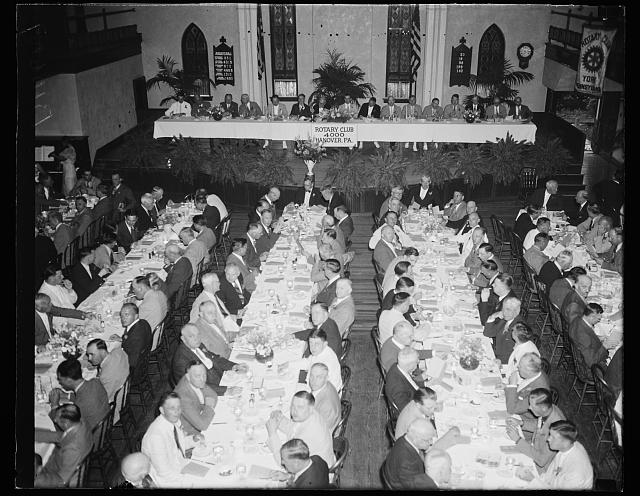In Board of Directors of Rotary International v. Rotary Club of Duarte 481 U.S. 537 (1987), the Supreme Court found that Rotary International did not have a First Amendment right to exclude women. The decision affirmed the judgment of the Court of Appeals of California, respecting a state statute requiring that business establishments admit women members.
Rotary Club’s charter was revoked after admitting women
Established in 1977, the Rotary Club of Duarte, California, had granted active membership to three women. Rotary International notified the Duarte branch that by doing so it was in violation of the group’s constitution; after an internal hearing, Rotary International’s board of directors revoked the Duarte club’s charter.
Lower courts looked at California law requiring establishments to admit women members
The Duarte club and two of the female members filed a complaint in California Superior Court (County of Los Angeles) alleging that Rotary International’s actions violated the Unruh Civil Rights Act under California law. Rotary International challenged the constitutionality of the Unruh Act as applied.
The superior court found in favor of Rotary International, concluding that neither the Duarte club nor Rotary International could be considered “business establishments” and therefore were not in violation of the Unruh Act in this instance.
Lower courts rejected that First Amendment protected exclusion on the basis of gender
The California Court of Appeals reversed, determining that the groups did indeed constitute business establishments and were subject to the Unruh Act. The appeals court rejected Rotary International’s claim that the First Amendment right of association protected its policy of excluding women and ruled that its stance was contrary to the principles set out in Roberts v. United States Jaycees (1984), which limited the rights of large business associations to exclude individuals on the basis of gender.
It ordered Rotary International to reinstate the Duarte club and prohibited it from enforcing its gender requirement on the club. (The court, however, acknowledged that it could not prevent Rotary International from adopting or enforcing membership rules or restrictions outside the state of California.)
Supreme Court upheld California law
Rotary International appealed to the California Supreme Court, which rejected its petition, and the case proceeded to the U.S. Supreme Court.
Roberts v. United States Jaycees provided the framework for the Court’s analysis of Rotary International’s constitutional claims. As it did in Roberts, the Court considered the nature and degree of constitutional protection under the First Amendment by determining whether a particular association is sufficiently personal or private to warrant constitutional protection by examining such factors as size, purpose, and selectivity and whether others are excluded from critical aspects of the relationship.
In the Court’s majority opinion, Justice Lewis J. Powell Jr. rejected the argument that the California law unduly interfered with Rotary Club members’ right of association and refused to address vagueness and overbreadth challenges that had not been presented in state courts. Justice Antonin Scalia wrote a concurring opinion.
This article was originally published in 2009. Dale Mineshima-Lowe is Managing Editor for the Center of International Relations, researcher and Associate Lecturer in both the Department of Politics and Department of Geography at Birkbeck, University of London, and Tutor of Politics and History at the City Lit, adult education college in Central London.

